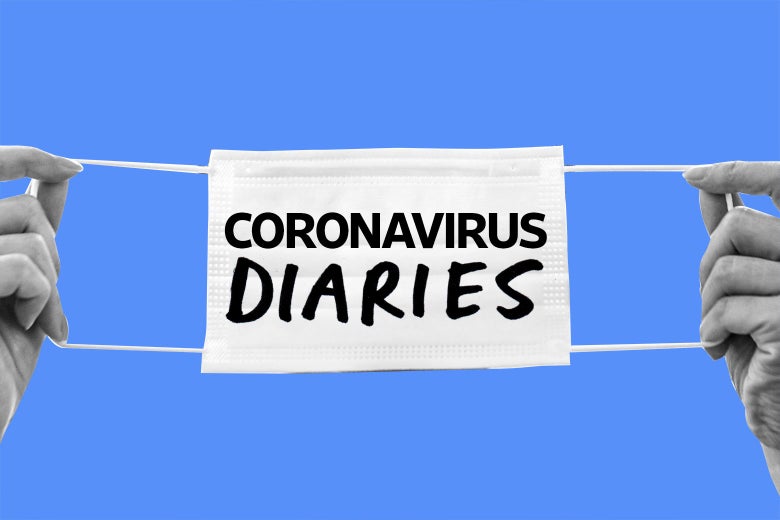
Photo illustration by Slate. Photo by Getty Images Plus.
Coronavirus Diaries is a series of dispatches exploring how the coronavirus is affecting people’s lives. For the latest public health information, please refer to the Centers for Disease Control and Prevention. For Slate’s coronavirus coverage, refer here.
This as-told-to essay is based on a conversation with Angela Vasa, a nurse manager, and Morgan Shradar, a clinical coordinator. Both Vasa and Shradar work at the National Quarantine Unit in Nebraska, where they are currently part of an emergency team deployed to care for 15 people from the Diamond Princess cruise ship who have been sent to the facility to be monitored to see if they are carrying COVID-19. Two patients have tested negative and could be sent home as early as Monday. The conversation has been transcribed and edited for clarity by Shannon Palus.
Quarantine started on Feb. 17th. It was a mixture of excitement and sadness. I think we all hope that we can use our facilities, and all of the skills that we’ve trained so hard for. At the same time, we know if we get to use our skills, somebody is having one of the potentially worst days of their life. But we all get a large smile, and a sense of adrenaline: this is what we’ve trained for.
When they arrive, we ask each of them to wear a mask, and then our staff wear a personal protective ensemble (PPE), with an N95 mask, gown, gloves, and shoe covers. What you see when you’re going into surgery is similar to what we wear here. We try to make it low-key, safe, and welcoming. We know that people are very scared. The guests do get to know us by our eyes, and they begin to recognize us as we come in and out of their rooms.
Each space looks like a nice hotel room. There’s a desk, dressers, a bed, a shower, exercise equipment—a bike or a treadmill in every room, along with aerobic weights, and yoga mats. We try to give them an assortment of options to maintain their physical health. Each of our rooms are at least 300 square feet, they have windows to the outside, they have full-sized beds, in-room fridge, coffee-makers, tea kettles. What you wouldn’t notice is all of the floors are seamless, all of the surfaces are wipeable, and purposefully selected to make sure that they can be disinfected easily. They all have negative air-pressure capability, with at least 12 air changes per hour.
The majority of our guests have never been to Nebraska. They have the opportunity to see snowfall and the ebbs and flows from high winds outside to the sunny days. Our jobs have shifting significantly to leading and maintain operations for the care of our guests. Both of us have varying levels of responsibility across multiple programs and we’ve reprioritized those.
Having a structured schedule is really important, and if we can provide some semblance of a normal routine for folks in quarantine, that helps maintain a better mental health outcome.
A normal day is: breakfast arrives between 8 and 8:15 a.m. The staff go to every room to deliver breakfast, and interact with our guests, see if they have any needs for the day, take their temperature. We take out trash, to make sure their room is clean.
Lunch is delivered around noon. We walk in, have some conversations, see if we can get them any magazines. We try to diversify every day what we’re asking and what we’re offering—if they want Sudoku, crossword puzzles. Our staff are in the background doing the daily cleaning right after lunch is delivered. Dinner rolls around between 5 and 5:30 p.m. We take into consideration meal requests, and cultural requests, as we get ready for Easter or whatever holidays they participate in.
At about 8-8:30 p.m. the staff are back around doing nightly temperature monitoring, assessment checks, making sure they’re settled in for the night. At night, staff are doing cleaning and laundry for our guests. They put the laundry back in folded, so they have it when they wake up in the morning. And then we repeat.
Visitors are not allowed to come in. If individuals don’t have a tablet or a phone or something like that, we would help them get one, we want to make sure they have access to friends and family. They do get packages, which has been lovely to see.
We can’t talk about individual treatment, but in general what we’re looking at with COVID-19 is viral pneumonia. When we’re looking at individuals, we’re looking for fever, cough, sore throat, congestion, shortness of breath. We evaluate individuals at their baseline, and make sure they’re all educated on what escalation of symptoms would look like. One of the biggest things we’re keeping in the forefront of our minds is while they might not need intensive medical support, the psychological and behavioral health support services are at this point just as important, if not more important.
Recently, we started having a town hall at 3 p.m. each day. Our guests can call or Skype in, and get updates. It’s easier to disseminate information to a large group, so everybody’s getting the same message of where we’re at in the process, what the next steps are. All of the individuals who are here have the opportunity to speak to each other. It’s a sense of community—they’re going through an experience that not many people go through.
Readers like you make our work possible. Help us continue to provide the reporting, commentary and criticism you won’t find anywhere else.
Join Slate Plusfrom Slate Magazine https://ift.tt/2IaJbil
via IFTTT
沒有留言:
張貼留言